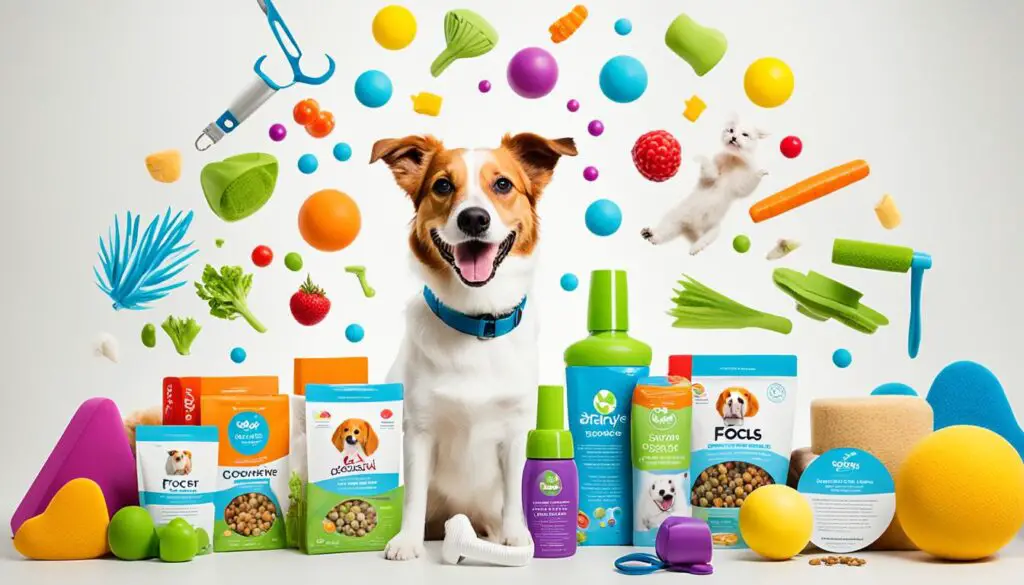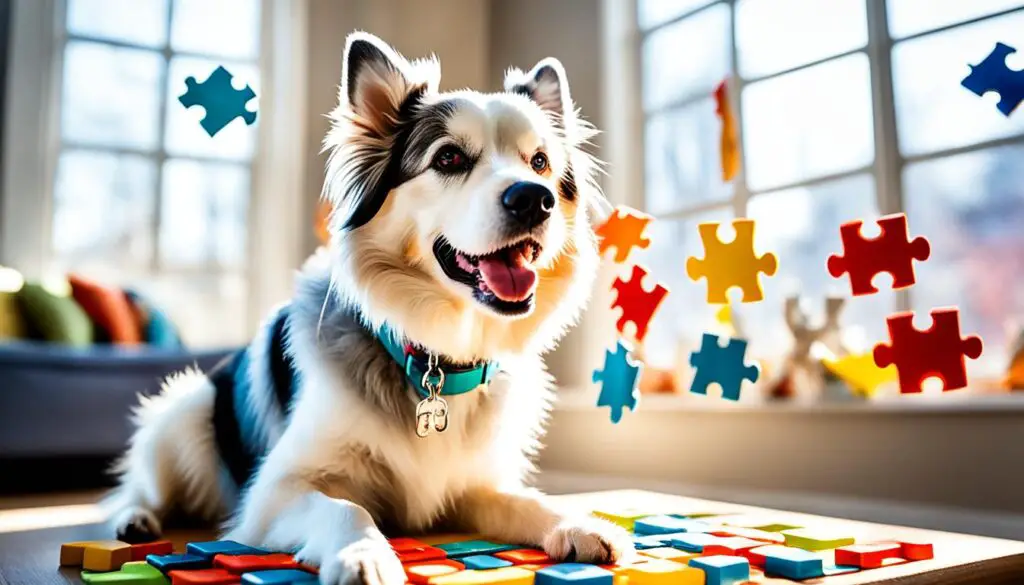Being pet parents, we all know how vital it is to keep our pets healthy and happy. We aim for them to enjoy long and joyful lives. To do this, it’s key to ensure our pets live a balanced life. This guide will offer useful advice to boost your pet’s well-being.
For your pet to thrive, you must look at all parts of their health. This includes giving them the right food, making sure they rest well, and are active. Also, don’t forget regular check-ups, good grooming, and maybe some extra supplements can also be a big help.
As National Pet Wellness Month is nearly here, it’s a great time to jumpstart your pet’s well-being. We’ll focus on the important areas that make for a well-balanced pet life.
Key Takeaways:
- Balanced living is vital for your pet’s overall health and well-being.
- Think about all the ways to keep your pet well, such as food, sleep, play, and visiting the vet.
- Give your pet a diet that is complete and well-rounded, packed with the right nutrients.
- Make sure your pet rests enough to be happy and healthy.
- Activity and play should be a regular part of your pet’s day for a brighter life.
Feeding Your Pet for Balanced Nutrition
It’s very important to give your pet the right food. This helps keep them healthy and full of life. To do this, choose a top-notch pet food. Look for ones that have everything your pet needs to be their best. This includes proteins, amino acids, and vitamins. A diet like this is known as complete and balanced. It’s what all pets need to do well.
It’s key to pick pet food with high-quality ingredients. Real meat should be the top protein in the food. Carbs and fiber come from grains or veggies. To get energy, the food should also have healthy fats. Stay away from pet food with bad things like artificial ingredients.
In the pet food world, there are set rules on what’s good. The Association of American Feed Control Officials (AAFCO) helps make sure pet food does what it should. Always check for the AAFCO label when choosing pet food. This shows the food has the right nutrients.
Your pet’s stage in life also affects what they should eat. Young animals need more food to grow strong. Older pets need less to avoid gaining too much weight. Your vet can help you figure out the best food no matter your pet’s age.
The Importance of Appropriate Feeding
Feeding your pet is more than just giving them food. It’s about keeping them healthy. Always follow the feeding tips on the pet food bag. Measure their food to avoid feeding too much. This helps to prevent your pet from becoming overweight.
Tip: Use a measuring cup to ensure accurate portion control and prevent overfeeding.
Make sure to watch your pet’s weight. Change their food amount if they gain too much. Being overweight can cause many health problems. Regular vet visits can make sure your pet is eating right. This helps keep them at a healthy weight.
A Complete and Balanced Diet Table
| Ingredient | Function |
|---|---|
| Protein | Essential for muscle development and repairing tissues. |
| Amino Acids | Building blocks for proteins and support various bodily functions. |
| Fatty Acids | Provide energy, maintain healthy skin and coat, and support brain function. |
| Vitamins | Essential for various metabolic processes and overall health. |
| Minerals | Support healthy bones, teeth, and overall bodily functions. |
Feed your pet right for a good life. Give them food that’s full of quality. This keeps them happy and healthy.
The Importance of Sleep for Your Pet’s Well-being
Pets, just like we do, need enough sleep to stay healthy and happy. Sleep is vital for their body and mind health. It helps them recharge and feel better. By understanding how much your pet needs to sleep, you can help them avoid behavior issues and health problems.
Every pet’s sleep requirement is a bit different. For example, puppies need around 18 to 20 hours. Adult dogs need about 8 to 13 hours. Kittens sleep a lot, about 20 hours, while adult cats sleep around 13 to 16 hours. Giving them the right amount of sleep boosts their energy and health.
If your pet doesn’t get enough sleep, they might act out or have problems. They could be irritable, have trouble focusing, or do things they shouldn’t. Not sleeping well might hint at some health issues. For example, cats with too much sleep could have a thyroid problem.
To help your pet sleep well, make their sleeping area comfy and clean. A regular bedtime helps too. This way, they’ll rest and wake at the same times. It’s good for their body clock.
“Sleep is essential for pets’ overall well-being. By ensuring they have sufficient sleep, pet owners can prevent behavioral problems and address potential health issues.”
Watching how your pet sleeps and talking to a vet can tell you a lot. Seek advice if you see big changes in how your pet sleeps or if they seem tired.
Key Takeaways:
- Just like humans, pets need sufficient sleep for their overall health and well-being.
- Puppies require about 18-20 hours of sleep, adult dogs need 8-13 hours.
- Kittens need close to 20 hours of sleep, while adult cats average 13-16 hours.
- Lack of sleep can lead to restlessness, behavioral problems, and may indicate underlying health issues.
- Creating a comfortable sleep environment and establishing a consistent sleep schedule is crucial for your pet’s well-being.
| Pet | Sleep Requirements (hours/day) |
|---|---|
| Dog (Puppy) | 18-20 |
| Dog (Adult) | 8-13 |
| Cat (Kitten) | 20 |
| Cat (Adult) | 13-16 |
Exercise and Playtime for a Happy and Healthy Pet
Exercise is very important for pets’ well-being. It’s not only about burning off extra calories and staying fit. It also helps with better sleep and good behavior. Just as we need it, pets need to move and think to be happy and healthy.
Dogs need 30 minutes to two hours of activity every day, based on their size, breed, and age. This can include walks, runs, or playtime. It’s a great way for both you and your dog to bond. Plus, it keeps them engaged and happy.
“Playtime is not only important for physical fitness, but also for cognitive development.”
Cats require less exercise, but play is still crucial for their well-being. Use interactive toys or items like feather teasers. They mimic hunting, which keeps your cat’s mind sharp and their instincts happy.
Puzzle toys are an amazing choice to exercise your pet’s brain. They challenge your pet to solve problems while having fun. This is great for all pets, especially for those growing older.
Older pets might experience a decline in brain health. But, giving them puzzle toys can slow down this process. The toys help keep their mind active and their memory sharp.
| Puzzle Toy Benefits | Description |
|---|---|
| Physical and Mental Stimulation | Puzzle toys offer a combination of physical and mental exercise. They need to use their senses to solve these puzzles. |
| Problem-Solving Skills | These toys make pets think to get to the treats. It’s like a fun workout for their brains. |
| Prevent Boredom and Destructive Behavior | Without enough mental challenges, pets can act out. Puzzle toys keep them busy and calm. |
| Slow Cognitive Decline | For older pets, puzzle toys are crucial. They keep the mind healthy, fighting off memory loss. |
It’s important to choose the right exercises for your pet. Talk to a vet or an animal expert to set up a good routine. This is vital, especially for pets with health problems or who are aging.
Conclusion: Embrace Balanced Living for Your Pet
My main goal as a pet parent is to keep my animal friend well-balanced and healthy. This guide gives key tips for a happy pet life. Providing a good diet, enough sleep, and lots of play and exercise is crucial.
I also found out supplements can really help my pet’s health. They can help with things like joint health, good skin and coat, and a strong immune system.
With National Pet Wellness Month nearing, I’m ready to boost my pet’s health. It’s a great time to see the vet and address any special pet health needs. I’m fully committed to making sure my pet has a great, healthy life. This means balanced living all the way.
FAQ
How can I provide a balanced diet for my pet?
To give your pet a balanced diet, choose high-quality food. It should meet nutritional standards from the AAFCO. Think about your pet’s age when picking food. Also, ask your vet for advice.
How much sleep does my pet need?
Pets need different amounts of sleep based on their age. Young pets, like puppies and kittens, sleep a lot – 18 to 20 hours. Adult dogs sleep 8 to 13 hours, and adult cats sleep around 13 to 16 hours. Make sure they have a cozy place to sleep and stick to a sleep routine. This keeps them healthy and happy.
Why is exercise important for my pet?
Exercise is key for your pet’s health. It helps them stay fit, sleep well, and behave. Dogs need 30 minutes to two hours of exercise daily, and cats should play for about 30 minutes. Playing with your pets, both mentally and physically, makes them joyful and healthy.
How can I embrace balanced living for my pet?
To live a balanced life, pets need the right food, plenty of sleep, and regular exercise. Add playtime, keep them groomed, and visit the vet often. Using supplements can also boost their health. By focusing on these areas, you help your pet live a great life.



